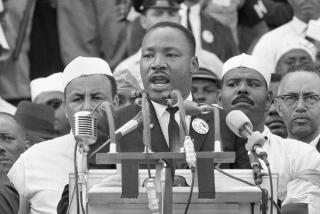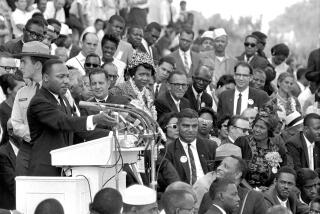An Honest Exhibition of Abe
- Share via
The Huntington Library’s extraordinary new Lincoln exhibit bears the title “The Last Best Hope of Earth: Abraham Lincoln and the Promise of America.” Among 12,000 words in a show that stakes much on the power of Lincoln’s language, those words that come just before the exit, for the visitor to take with him back into the city, may name the promise best.
“When one starts poor,” Lincoln wrote, “as most do in the race of life, free society is such that he knows he can better his condition. . . . I am not ashamed to confess that twenty-five years ago I was a hired laborer. . . . I want every man to have the chance . . . and I believe a black man is entitled to it.”
Work hard and get ahead. Is this the “promise of America”? Some may smile. Lincoln, who saw in himself the fulfillment of the promise, took it with complete seriousness. As a young man, he had done work of the sort that in his day was also done by slaves and in ours often by Latinos hired on the street corner. He knew, as only a hired hand can, that he was the moral equal of those who hired him. His greatness lay in his refusal to deny any fellow worker, even a slave, “the chance” he claimed for himself.
Initially, Lincoln thought that if slavery could be confined to the original slave-holding states, it would die out. But as the exhibit shows, the 1854 Kansas-Nebraska Act, which changed American law to permit slavery to spread, showed him his mistake: The beast was not going to die without a fight. At this turning point in his life, Lincoln began his long, canny campaign to subordinate the Constitution, which assumed and permitted the continuation of slavery, to the higher moral standard of the Declaration of Independence. In 1858, he would write: “I think the negro is included in the word ‘men’ used in the Declaration of Independence. I believe the declaration that ‘all men are created equal’ is the great fundamental principle upon which our free institutions rest.”
But “all men are created equal” became the fundamental principle of American society in good measure because Lincoln insisted that no lesser principle would do. And in winning his way through to that revision, Lincoln also deepened the dignity of labor itself in a free society. This is the hidden heart of what the Huntington calls “the American promise,” also known as the American dream.
More to Read
The biggest entertainment stories
Get our big stories about Hollywood, film, television, music, arts, culture and more right in your inbox as soon as they publish.
You may occasionally receive promotional content from the Los Angeles Times.










